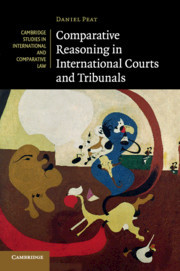Description
Comparative Reasoning in International Courts and Tribunals
Cambridge Studies in International and Comparative Law Series
Author: Peat Daniel
This book examines an unexplored method of interpretation: the use of domestic law in the interpretation of international law.
Language: English
Subject for Comparative Reasoning in International Courts and Tribunals:
Approximative price 31.58 €
In Print (Delivery period: 14 days).
Add to cart
Comparative Reasoning in International Courts and Tribunals
Publication date: 07-2020
Support: Print on demand
Publication date: 07-2020
Support: Print on demand
Approximative price 135.14 €
In Print (Delivery period: 14 days).
Add to cart
Comparative Reasoning in International Courts and Tribunals
Publication date: 06-2019
292 p. · 15.7x23.4 cm · Hardback
Publication date: 06-2019
292 p. · 15.7x23.4 cm · Hardback
Description
/li>Contents
/li>Biography
/li>
Domestic law has long been recognised as a source of international law, an inspiration for legal developments, or the benchmark against which a legal system is to be assessed. Academic commentary normally re-traces these well-trodden paths, leaving one with the impression that the interaction between domestic and international law is unworthy of further enquiry. However, a different - and surprisingly pervasive - nexus between the two spheres has been largely overlooked: the use of domestic law in the interpretation of international law. This book examines the practice of five international courts and tribunals to demonstrate that domestic law is invoked to interpret international law, often outside the framework of Articles 31 to 33 of the Vienna Convention on the Law of Treaties. It assesses the appropriateness of such recourse to domestic law as well as situating the practice within broader debates regarding interpretation and the interaction between domestic and international legal systems.
Introduction; 1. The limits of the Vienna Convention; 2. Domestic law in the jurisprudence of the International Court of Justice; 3. The interpretation of schedules of commitments in the WTO; 4. International investment law and the public law analogy; 5. Consensus doctrine in the European Court of Human Rights; 6. Domestic law and system building in the ICTY; Conclusion.
Daniel Peat is an Assistant Professor in Public International Law at the Grotius Centre for International Legal Studies at Universiteit Leiden. Before joining Universiteit Leiden, he worked at the International Court of Justice as an Associate Legal Officer for President Abdulqawi A. Yusuf. Daniel was awarded a Ph.D. in Law from the University of Cambridge, where he was a member of Gonville and Caius College and a recipient of the WM Tapp Studentship. He is a graduate of The Graduate Institute, Geneva, and the London School of Economics and Political Science, where he was awarded the Lauterpacht/Higgins Prize for Public International Law. Daniel co-edited Interpretation in International Law (2015) and acts as Rapporteur for the International Law Association Study Group on the Content and Evolution of the Rules of Interpretation.
© 2024 LAVOISIER S.A.S.




